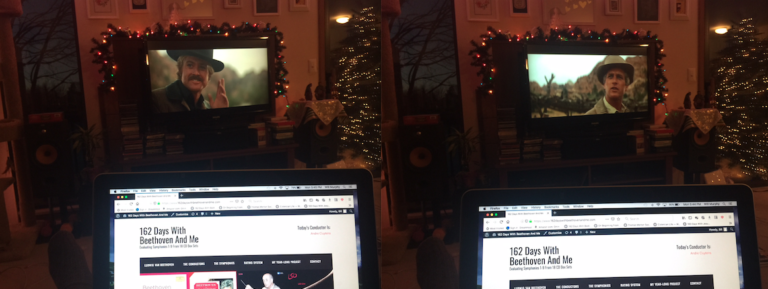
My listening post this evening is in front of the TV with the classic Robert Redford/Paul Newman movie Butch Cassidy and the Sundance Kid playing.
Earlier, we watched a documentary about the real-life Butch Cassidy and Sundance Kid So, we decided to watch the movie again.
It holds up, not only because of the chemistry between Redford and Newman (which was proved again in the 1973 Oscar-winning movie The Sting), but also because of William Goldman‘s superb script.
Anyway, with Redford and Newman doing their thing on the screen, I’m doing my thing in the chair – my thing being listening to French conductor Andre Cluytens (1905-1967), Orchestre Philharmonique De Berlin, and Beethoven’s Symphony No. 9 in D minor.
(“Raindrops Keep Falling On My Head” is playing now; an odd – but unique and perfect – choice for a song in a movie that takes place in the Old West in the early 1900s.)
I’ve encountered Andre Cluytens eight times previous to this evening, on…
 Day 6. Rating: “Huzzah!” (A masterful performance.)
Day 6. Rating: “Huzzah!” (A masterful performance.)
Day 24. Rating: “Meh!”
Day 42. Rating: “Meh!”
Day 60. Rating: “Huzzah!”
Day 78. Rating: “Huzzah!”
Day 96. Rating: “Huzzah!”
Day 114. Rating: “Huzzah!”
Day 132. Rating: “Meh!”
Five “Huzzah!” and three “Meh!” ratings. That’s well above average.
What will tonight bring?
I’ll know in an hour, give or take.
 Beethoven wrote his symphonies in four parts (except for the Sixth, which is in five). The time breakdown of this particular one (Symphony No. 9 in D minor), from this particular conductor (Cluytens, at age 52-55) and this particular orchestra (Orchestre Philharmonique De Berlin), at this particular time in history (1957-1960) on this particular record label (Parlophone/Warner Music France) is as follows:
Beethoven wrote his symphonies in four parts (except for the Sixth, which is in five). The time breakdown of this particular one (Symphony No. 9 in D minor), from this particular conductor (Cluytens, at age 52-55) and this particular orchestra (Orchestre Philharmonique De Berlin), at this particular time in history (1957-1960) on this particular record label (Parlophone/Warner Music France) is as follows:
I. Allegro ma non troppo, un poco maestoso………………….18:06
II. Molto vivace………………………………………..11:36 (booklet says 1:28)
III. Adagio molto e cantabile……………………………..17:21
IV. Finale……………………………………………..25:34
Total running time: 72:45
My Rating:
Recording quality: 3 (noticeable hiss that sounds like a falling rain; otherwise, not to0 bad given its nearly 60-year-old tapes; instruments seem a trifle muddy, indistinct)
Overall musicianship: 3 (by the book, lacks magic)
CD liner notes: 2 (everything is written in French, which is great if one is from Paris; plus, no clear indication of when these symphonies were recorded)
How does this make me feel: 3 (“Meh!”)
Where do I begin to describe how bored I was listening to this?
The sound quality is not to my liking. The orchestra doesn’t sound lush, deep, expansive. It sounds mushed together like a slightly better mono recording. The sound is a bit fuzzy.
The performance – especially in the all-important Movement I – lacks energy. It plods instead of pulsates. It doesn’t draw me in. Frankly, it leaves me cold.
From those ignoble beginnings, Movement II would have had to absolutely electrify to overcome the previous movement’s shortcomings. It doesn’t. And it should have. It’s such a powerful and well-known melody. Why didn’t it come across with more punch and pizzazz?
Movement III follows the tone of first two movements, which perhaps makes it the slowest and most boring of the four.
I was looking forward to Movement IV just to hear tenor Nicolai Gedda (1925-2017), the world-renowned Swedish opera singer. I didn’t know he died last year. That made me sad. I have several of his CDs and have always enjoyed his command of the art form.
Bottom line: In some strange twist of fate (or irony), I thought the best movement of this performance was Movement IV – the vocal part, which for me is a monumental admonition. I dislike opera. So for me to proclaim that the opera part was the best surely speaks to how much I disliked the previous three movements.
With any luck, I’ll never listen to this performance again.
“Meh!”
